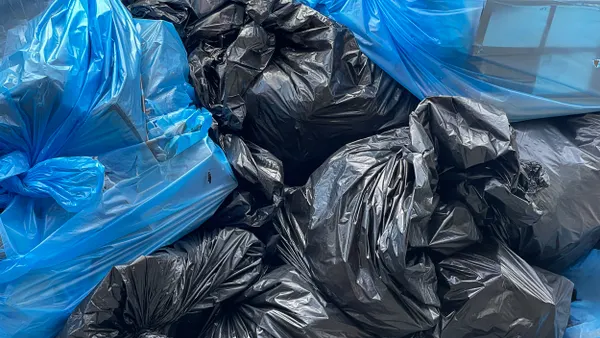Dive Brief:
- Washington, D.C.'s Department of Public Works (DC DPW) recently released a study that estimates nearly 149,000 tons of food and yard waste could be collected per year from both residential and commercial sources. The District is currently composting up to 7,000 tons of yard waste and about 60 tons of food waste at community gardens on an annual basis.
- The study, conducted by Resource Recycling Systems (RRS), identified regional processing capacity as one of the main challenges. Only two facilities within a 40-mile radius currently accept food waste and neither offer enough capacity for the District's full needs. RRS recommends siting an aerated static pile composting facility within the District as the most cost-effective solution, because revenue could be generated from tip fees and transfer costs could be avoided by taking material directly to the site.
- RRS recommends a five-year rollout plan for organics collection that would start with siting, permitting and contracting for the facility during the first two years. During the third year, collection would be offered for select areas and the material would be taken to a regional facility. The composting site would open in the fourth year, with collection expanded to all neighborhoods by the fifth year.
Dive Insight:
This study is the latest in a series of steps toward achieving the 80% diversion goal set by the Sustainable Solid Waste Management Amendment Act of 2014. That act also provided D.C. authority to enact an organics diversion plan. DPW hasn't taken action on this front yet aside from supporting programs for schools and community gardens. Now that the RRS study has shown high diversion potential, particularly in the commercial and institutional sectors, the D.C. may have more impetus to pursue new organics requirements.
Siting a new facility is sure to present many of the usual challenges. Though since the cost to transfer and tip material at the two facilities in Maryland and Virginia is estimated to be around $72 per ton RRS makes the case for D.C. both saving and making money by building their own operation. A composting facility of between 10-20 acres could cost anywhere from $7-11 million, depending on siting factors. Depending on the pace and scale of a curbside collection roll-out, initial capital costs for containers and trucks could range from approximately $17-22.5 million. DPW is also still pursuing the potential to co-digest organics at existing wastewater treatment infrastructure.
Enacting these recommendations may be complicated, but this study now gives DPW a firm basis to begin moving away from landfill and waste-to-energy use per their goal. Based on a newly created citywide metric DPW is currently diverting about 21% of the waste it manages so the potential to co-collect food scraps with yard waste offers a big opportunity to grow that number. During a January interview with Waste Dive, D.C. DPW Director Christopher Shorter said that cost will be a factor, but not necessarily at the expense of larger environmental outcomes.











